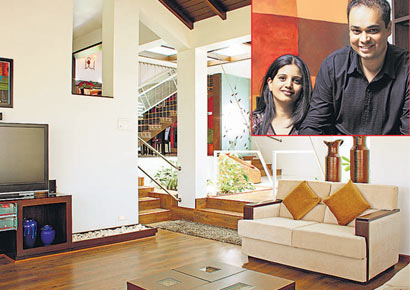IT major, Tata Consultancy Service is in the process of buying 35 acre SEZ plot in Bangalore suburb Whitefield for a total consideration of over Rs 300 crore.
"Salarpuria Sattva is aggregating land for TCS and the land deal is expected to conclude shortly. When fully complete, the new campus will accommodate up to 40,000 professionals with the potential to develop 3mn sft," said three people having direct knowledge of the development.
A detailed email sent to TCS did not elicit any response.
Currently, land value in Whitefield ranges between Rs 12 core and Rs 20 crore per acre.TCS currently occupy 3 lakh sft in Gopalan SEZ in Whitefield.
The construction for the new facility is expected to be completed within 36 months from the date of commencement.
As of September 30, 2011, TCS employed 214,770 professionals. The Mumbai headquartered company has a global presence with 145 offices in 42 countries and 106 delivery centers in 20 countries, according to company's website.
Whitefield (east of Bangalore) has seen at least a dozen land transactions in the last few months due to lower land prices and rising demand among corporate.
Recently, Shriram Properties purchased 27 acre for Rs 146 crore, RMZ Corp has bought 28 acres for Rs 133 crore and Total Environment Building Systems picked up 18-acre for Rs 150 crore.
According property consultancy firm, Colliers International, peripheral business district (PBD) of outer ring road (ORR), Whitefield, electronic City and North Bangalore are being preferred by corporates looking for consolidation and expansion plans.
Whitefield is seen as a cost-effective market for office space compared to ORR with Grade A office space rentals at Rs 28 per sft.
"In 2010-2011 there were demand for office space in ORR but the availability was zero. This has helped the demand to move to whitefield as the rentals are 40% cheaper there," said Colliers International regional director- commercial lease Goutam Chakraborty said.
Bangalore recorded total absorption of 7 mn sq ft till Q3 of CY 2011, an increase of 20% over last year. Approximately, 0.41 million sq.ft. of office space was released into the whitefield and electronic City
micro markets, whilst absorption was estimated at around 0.4 million sq.ft, mentioned a report by CBRE, world's largest real estate consultancy firm.
The third quarter saw stronger leasing activity with HUL's lease of 400,416 sq ft in Prestige Shantiniketan, Airbus taking 1,20,000 sq ft in Xylem, Broadcom leased 2,60,000 sq ft in RMZ Ecospace and NetApp picked up 1,12,029 sq ft in Embassy Golf Links.
"Salarpuria Sattva is aggregating land for TCS and the land deal is expected to conclude shortly. When fully complete, the new campus will accommodate up to 40,000 professionals with the potential to develop 3mn sft," said three people having direct knowledge of the development.
A detailed email sent to TCS did not elicit any response.
Currently, land value in Whitefield ranges between Rs 12 core and Rs 20 crore per acre.TCS currently occupy 3 lakh sft in Gopalan SEZ in Whitefield.
The construction for the new facility is expected to be completed within 36 months from the date of commencement.
As of September 30, 2011, TCS employed 214,770 professionals. The Mumbai headquartered company has a global presence with 145 offices in 42 countries and 106 delivery centers in 20 countries, according to company's website.
Whitefield (east of Bangalore) has seen at least a dozen land transactions in the last few months due to lower land prices and rising demand among corporate.
Recently, Shriram Properties purchased 27 acre for Rs 146 crore, RMZ Corp has bought 28 acres for Rs 133 crore and Total Environment Building Systems picked up 18-acre for Rs 150 crore.
According property consultancy firm, Colliers International, peripheral business district (PBD) of outer ring road (ORR), Whitefield, electronic City and North Bangalore are being preferred by corporates looking for consolidation and expansion plans.
Whitefield is seen as a cost-effective market for office space compared to ORR with Grade A office space rentals at Rs 28 per sft.
"In 2010-2011 there were demand for office space in ORR but the availability was zero. This has helped the demand to move to whitefield as the rentals are 40% cheaper there," said Colliers International regional director- commercial lease Goutam Chakraborty said.
Bangalore recorded total absorption of 7 mn sq ft till Q3 of CY 2011, an increase of 20% over last year. Approximately, 0.41 million sq.ft. of office space was released into the whitefield and electronic City
micro markets, whilst absorption was estimated at around 0.4 million sq.ft, mentioned a report by CBRE, world's largest real estate consultancy firm.
The third quarter saw stronger leasing activity with HUL's lease of 400,416 sq ft in Prestige Shantiniketan, Airbus taking 1,20,000 sq ft in Xylem, Broadcom leased 2,60,000 sq ft in RMZ Ecospace and NetApp picked up 1,12,029 sq ft in Embassy Golf Links.





